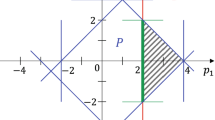Abstract
This paper deals with an extention of Fenchel duality theory to fractional extremum problems, i.e., problems having a fractional objective function. The main result is obtained by regarding the classic Fenchel theorem as a decomposition property for the extremum of a sum of functions into a sum of extrema of functions, and then by extending it to the case where the addition is replaced by the quotient. This leads to a generalization of the classic concept of conjugate function. Several remarks are made about the conceivable further generalizations to other kinds of decomposition.
Similar content being viewed by others
References
Fenchel, W.,Convex Cones, Sets, and Functions, Mimeographed Lectures Notes, Princeton University, Princeton, New Jersey, 1951.
Rockafellar, R. T.,Convex Analysis, Princeton University Press, Princeton, New Jersey, 1969.
Giannessi, F.,Theorems of Alternative and Optimality Conditions, Journal of Optimization Theory and Applications, Vol. 42, pp. 331–365, 1984.
Ishii, H., Ibaraki, T., andMine, H.,Fractional Knapsack Problems, Mathematical Programming, Vol. 13, pp. 255–271, 1977.
Mjelde, K. M.,Methods of Allocation of Limited Resources, J. Wiley, New York, New York, 1983.
Aczel, J.,Lectures on Functional Equations and Their Applications, Academic Press, New York, New York, 1966.
Dragomirescu, M.,The Ascendent Unions Separation Theorem and a Sharp Nonconvex Extension of Fenchel's Duality Theorem, Revue Roumaine de Mathématiques Pures et Appliquées, Vol. 24, pp. 913–920, 1979.
Evers, J. J., andVan Maaren, H.,Duality Principles in Mathematics and Their Relations to Conjugate Functions, Twente University of Technology, Enschede, Holland, Research Report No. 336, 1981.
Lindberg, P. O.,A Generalization of Fenchel Conjugation Giving Generalized Lagrangians and Symmetric Nonconvex Duality, Survey of Mathematical Programming, Edited by A. Prekopa, North-Holland Publishing Company, Amsterdam, Holland, Vol. 1, pp. 249–267, 1979.
Lindberg, P. O.,Fenchel Duality from LP Duality, Mathematische Operationsforschung und Statistik, Series Optimization, Vol. 11, pp. 171–180, 1980.
Magnanti, T. L.,Fenchel and Lagrange Duality Are Equivalent, Mathematical Programming, Vol. 7, pp. 253–258, 1977.
Rockafellar, R. T.,Conjugate Duality and Optimization, Regional Conference Series in Applied Mathematics, No. 16, pp. 1–74, 1974; Society for Industrial and Applied Mathematics, Philadelphia, Pennsylvania, 1974.
Rockafellar, R. T.,Extension of Fenchel's Duality Theorem for Convex Functions, Duke Mathematical Journal, Vol. 33, pp. 81–89, 1966.
Schaible, S.,Fractional Programming, I, Duality, Management Science, Vol. 22, pp. 858–867, 1976.
Schaible, S.,Duality in Fractional Programming: A Unified Approach, Operations Research, Vol. 24, pp. 452–461, 1976.
Author information
Authors and Affiliations
Additional information
Communicated by I. Galligani
Rights and permissions
About this article
Cite this article
Beoni, C. A generalization of Fenchel duality theory. J Optim Theory Appl 49, 375–387 (1986). https://doi.org/10.1007/BF00941068
Issue Date:
DOI: https://doi.org/10.1007/BF00941068




